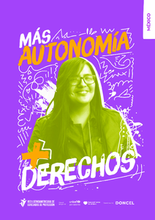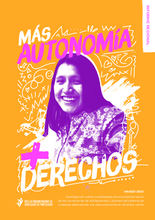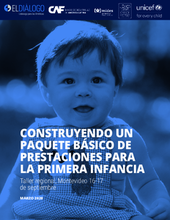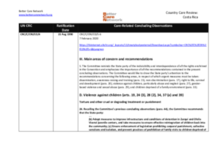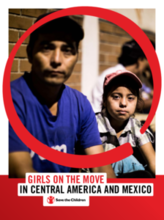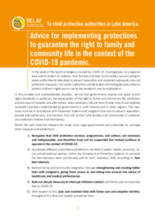Displaying 141 - 150 of 379
En este informe se presentan los resultados de la investigación llevada adelante en México que tuvo por objetivo construir información sobre las principales políticas, medidas y acciones que se desarrollan a nivel regional orientadas a acompañar el egreso de adolescentes y jóvenes del sistema de cuidados alternativos e indagar respecto de su eficacia, efectividad, sostenibilidad y adecuación a un enfoque de derechos.
El presente informe reúne los hallazgos principales de una investigación de carácter exploratorio-descriptivo que ha sido desarrollada en seis países de la región (Argentina, Bolivia, Brasil, Colombia, México y Perú). El objetivo fue documentar y analizar las políticas, estrategias y acciones desarrolladas para promover y acompañar la transición de adolescentes desde el sistema de cuidados alternativos hacia la vida autónoma.
El Diálogo Interamericano y UNICEF han conformado una alianza orientada a fortalecer la construcción y la implementación de políticas integrales de la primera infancia basada en evidencia, en los países de la región. En esa línea, se convocó un Taller regional en Uruguay. Este documento presenta los principales elementos destacados y discutidos en la reunión y los aspectos en los cuales hay un mayor acuerdo entre los expertos participantes del taller.
This country care review includes the care related Concluding Observations adopted by the Committee on the Rights of Persons with Disabilities and the Committee on the Rights of the Child.
This exploratory research led by Kindernothilfe between May – July 2020 shows how the challenges facing working children and their families have been exacerbated since the outbreak and it presents their recommendations for effective and relevant responses to the pandemic.
Este artículo explora las prácticas institucionales que facilitan u obstaculizan la protección de derechos de niños, niñas y adolescentes en el sistema de protección de la niñez en Honduras a través de sus diferentes etapas.
The primary purpose of this report is to recommend evidencebased strategies to improve the relevance and effectiveness of field interventions that target development outcomes for girls on the move in Central America and Mexico.
Esta infografia demuestra el proceso de integración de niños, niñas, y adolescentes (NNA) en familias de acogimiento temporal en Guatemala durante la pandemia de COVID-19.
Esta guía se desarrolló para ayudar al equipo psicosocial a realizar un seguimiento virtual de los NNA y las familias durante la pandemia de COVID-19.
This call to public authorities presents recommendations from RELAF for preventing family separation and implementing adequate care and protection measures to protect children’s rights put at risk by the pandemic and its implications.

